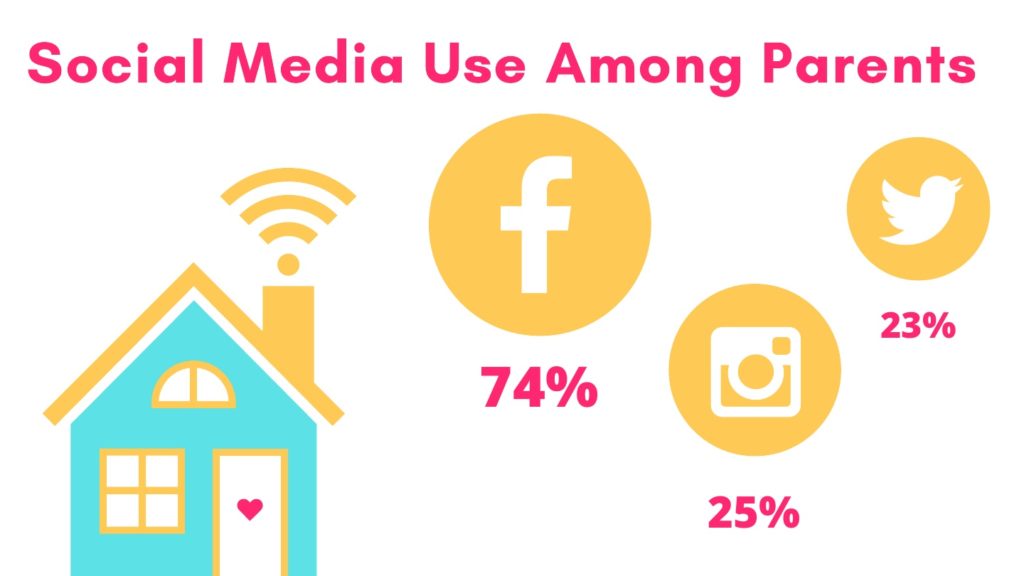
From monthly family updates to mommy blogs, social media has created a unique family niche on the internet. Growing numbers of families are creating a network to share their families’ experiences, such as moving to a new home or raising children. Some will create posts on the “how-tos” of parenting or discuss the controversies of home life like vaccines or child discipline.
Families publishing their lives on social media has become a growing trend in recent years, but what are the consequences on the family away from the screen? How are family dynamics affected by social media?
Kelsey Ellis, a new mom and BYU alumna now living in Columbus, Ohio, said she likes to post about her family and everyday events because it provides her a support group of people in her exact situation.
Ellis said there are two reasons why she posts on Facebook: to show everyone, especially her mom, how much her daughter has grown, and to document her recovery after childbirth.
“Social media gave me a voice in a time when I was trying to grasp on to my dignity,” Ellis said.
Ellis also said social media has given her and her family the ability to start meaningful conversations about childbirth and mothering.
“When you have a baby, everything is about that baby,” Ellis said. “There isn’t a whole lot of focus on the mom. If you do have any focus on the mom, it’s comments that are well intended but seem fake. I’ve heard people say, ‘Wow, it doesn’t look like you pushed out a baby!’ But what if I did look like I just pushed out a baby? Why is that negative?”
Ellis said the purpose of her chronicling her family experiences is to document the deeper emotions that go into being a mom.
While Ellis uses social media to start meaningful conversations, Saratoga Springs resident and former BYU student Kate Neish uses it to share stories and images of her son, Teddy.
“As far as social media and parenting goes, I really like social media,” Neish said. “I feel like a lot of the work that parents do with their children is silent and goes unnoticed.”
Neish said social media allows her to share the intensive work inherent in being a mom. While she acknowledged that parenting isn’t the most exciting work, she appreciates the community social media creates for parents to offer support for each other.
“I appreciate getting comments that say, ‘Hey, I know what you’re going through and that’s great, hang in there, being a parent is hard, you got this.'” Neish said.
While Neish and Ellis focus their posts on triumphs and travails of motherhood, other families set their focus on a more general audience. Bailee Morris, a former BYU student and Vineyard, Utah, resident, uses Facebook and Instagram to spread messages of family topics most people would shy away from.
“I feel really strongly about putting content to the world that most people don’t talk about,” Morris said. “For example, the other day I posted on how I genuinely like working. I think that’s one of those topics that can be stigmatized in LDS culture.”
In addition to posting less-than-common conversation starters, Morris strives to post content on the internet that she feels will help their children’s self-esteem.
“I am teaching myself to say kind things to myself and hopefully showing my daughters and other people the importance of self-esteem,” Morris said.
The Morris family’s rules on social media are simple: “As long as it’s going to something that is uplifting or helpful, even if it’s an unpopular opinion, then it’s worth posting,” Morris said.
Families like Coreena White’s use social media to simply connect with their family members, near or far. White, the resolutions manager at the Harold B. Lee Library, is an avid user of social media and uses it to stay connected to her five children, three of whom live outside of Utah.
“I use social media to create something of an online scrapbook to preserve memories I make with my family,” White said.
While each of these families tries to pursue an uplifting attitude when posting on social media, it’s not without challenges. The Ellis, Neish, White and Morris families have all faced familial backlash from their posts.
“Sometimes my teenager will tell me I have posted an unflattering picture of her,” White said. “Other times there are Facebook arguments from relatives from posts I’ve made that weren’t intended to do so.”
In each case, the mother of each family has been the frontrunner of the family’s social media presence.
BYU family life professor Sarah Coyne said that women tend to be more relationship-focused, hence their general desire to want to keep existing or create new relationships online.
“Mothers are considered to be the keepers of the family in terms of keeping a place where families can get together and create memories,” Coyne said. “You can see how social media would fit into that desire.”
Another reason Coyne said that mothers are more inclined to post their family’s lives on social media is that mothers, especially stay-at-home mothers, tend to feel more isolated, so social media allows them to have some sort of connection with other people.
Coyne cautioned families to think critically about social media, which she says allows families to only portray the best and clean-cut moments of family life.
“The problem is if moms are reaching out to others and begin to think that parenting is easy and doubt their abilities to raise a family,” Coyne said.
Coyne’s numerous studies have shown that families that engage with each on social media tend to result in good outcomes in family engagement, but that social media can have negative effects when people begin to engage in social comparisons.
Whether families are affected for good or bad, social media appears to continue to be an active catalyst in families’ dynamics which will be determined on how they choose to interact with social media.




